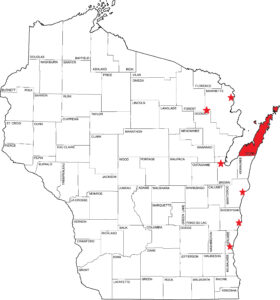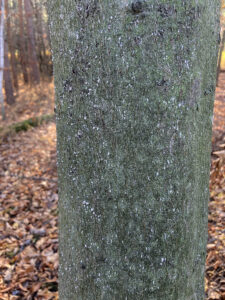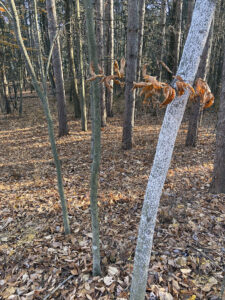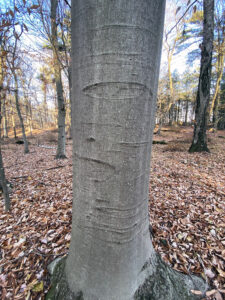
Locations of known moderate or high beech scale populations as of November 2023 are shown in red. High populations are known to be widespread in Door County. / Map Credit: Bill McNee, Wisconsin DNR
By Bill McNee, DNR Forest Health Specialist, Oshkosh;
bill.mcnee@wisconsin.gov or 920-360-0942
Earlier this year, we reported that high populations of the non-native insect beech scale (Cryptococcus fagisuga) were identified for the first time in Marinette and Sheboygan counties. Since then, several more sites with moderate or high scale populations have been identified (see map).
With the 2023 generation building on the 2022 generation, the insect has had time for numbers to proliferate. Heavily infested American beech (Fagus grandifolia) trees may appear white in the forest now that the leaves have fallen. The insect has one generation per year, with egg-laying occurring in the summer and egg-hatching occurring in the summer and fall.

White “wool” of beech scale on a moderately infested beech tree at Kohler-Andrae State Park in November 2023. / Photo Credit: Bill McNee, Wisconsin DNR

White “wool” of beech scale on a heavily infested beech tree at Kohler-Andrae State Park in November 2023. / Photo Credit: Bill McNee, Wisconsin DNR
Landowners and managers outside of Door County who spot noticeable populations of beech scale – similar to what is shown in the two photos – are encouraged to take a picture and report it to their DNR Forest Health Specialist. We are interested in understanding where the scale populations have increased as we continue to monitor how the disease might spread into new counties.
A scale insect and a fungal pathogen combination causes beech bark disease, leading to tree mortality. The fungus typically arrives several years after the scale population becomes prevalent because the scale-feeding wounds are necessary for the disease-causing fungi to enter the tree.
Door County remains the only Wisconsin county where beech bark disease is known to occur and where extensive beech decline and mortality have occurred. More information about beech bark disease can be found on the DNR’s website.
American beech trees are found only in the eastern counties and can be identified by their smooth steel-gray bark. Beech trees commonly have orange, dry leaves still attached to the tree in late fall.

Typical smooth, steel-gray bark found on a beech tree. / Photo Credit: Bill McNee, Wisconsin DNR
Wisconsin has two native “woolly” lookalikes that are common and may be misidentified as beech scale: pine bark adelgid (on white pine) and beech blight aphid (a very fluffy aphid found on beech twigs and branches).
